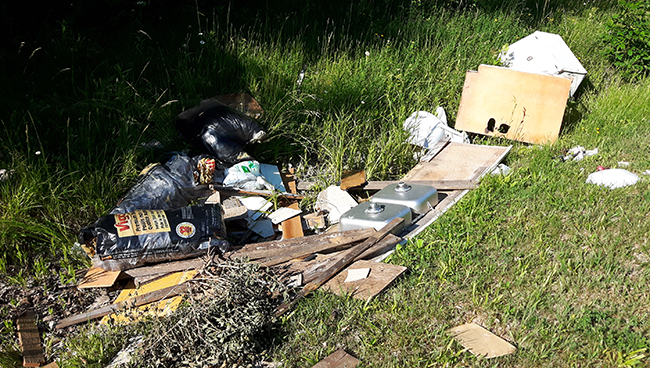Illegal dumping big problem for Aamjiwnaang

By Colin Graf
AAMJIWNAANG – Sometimes it’s household garbage, sometimes it’s construction waste, once it was even an old boat full of junk, but whatever it might be, the Chief and Council at the Aamjiwnaang First Nation are sick and tired of illegal dumping by people from the neighbouring city of Sarnia, and are taking steps to curb the problem.
“Enough is enough” says Chief Joanne Rogers, announcing that Aamjiwnaang works crews will start sifting through garbage dumped illegally, looking for anything that might identify an address the material came from. “At that point, police will be called,” she tells Anishinabek News. Sarnia police have agreed to work with the First Nation to try and track down those responsible, she says.
“We used to accept this as part of our job,” says public works coordinator Brian Bois, explaining how he sends out a pickup truck every week down one service road in the community to pick up illegal dumping. “It almost always comes back full,” he says. With a two bag limit on garbage day in Sarnia, and once-a-month large item pickup, it’s become convenient for too many Sarnians to dump on the First Nation’s land, he explains. With Sarnia being an industrial city, there are waste companies just down the road from Aamjiwnaang which will take a load of garbage for only $15. “People just don’t want to pay,” Bois says.
Collecting other people’s waste is not only inconvenient, but also costly for Aamjiwnaang. “We spend a lot of time and labour on this,” says Bois, estimating the cost between $30,000 and $60,000 a year.
Outsiders have even been dumping large items in dumpsters set up for local residents to dump items too large to be set out with the regular garbage, Bois says.
In addition to bringing in the police, Bois says six video cameras have been installed along the service road, with two more to follow. No dumping signs have also been put along the road.
The worst incident he can remember was last summer, when workers found an old abandoned boat filled with garbage. “We had to order a dumpster for that,” Bois remembers.
Sarnia’s police chief has been made aware of the problem, and officers are “absolutely ready” to work with Aamjiwnaang on the problem, says media officer Const. Giovanni Sottosanti. If workers can find some evidence showing where the garbage may have come from, officers will speak with the people at that address, he says. While not guaranteeing charges will be laid, officers will investigate, he explains.
Littering on the side of the road can bring a $110 fine under the Highway Traffic Act, Sottosanti says, and charges of criminal mischief can also be laid if someone’s actions are hampering another person from enjoying the full use of their property.


